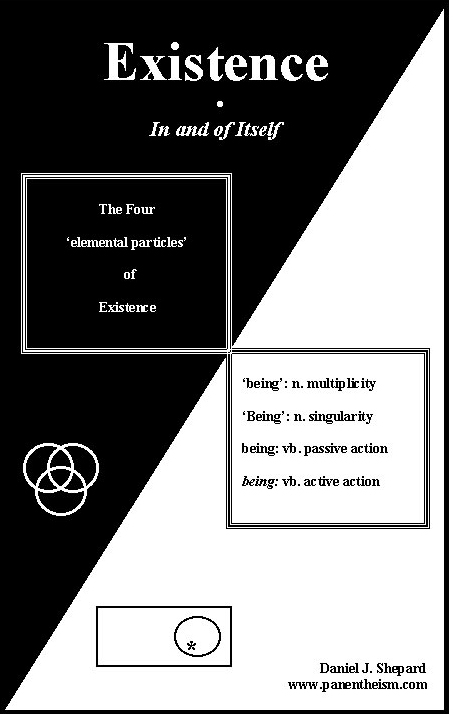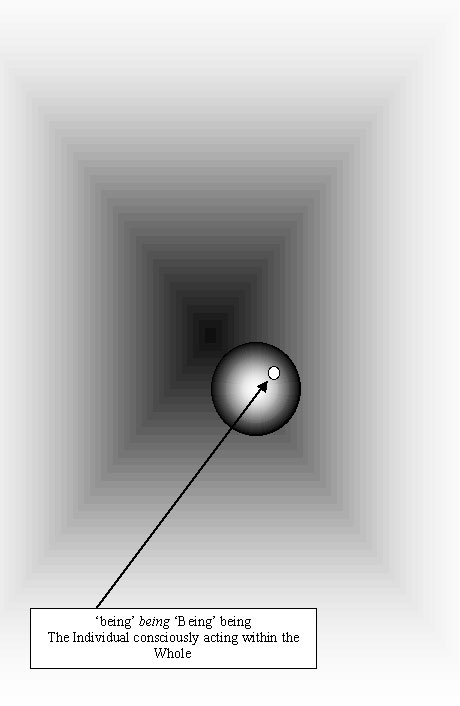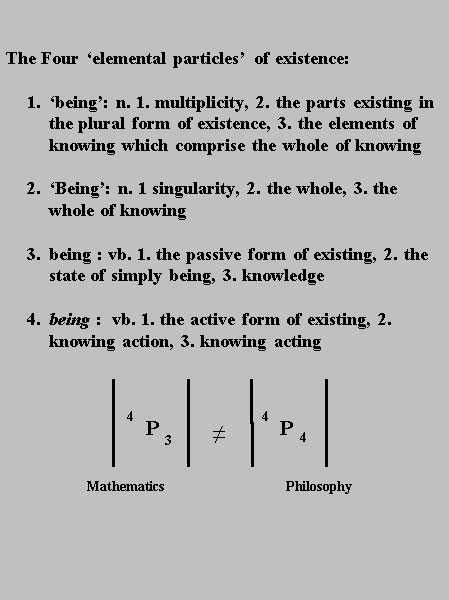|
 
Existence : In and of Itself : The Four Elemental Particles of Existence

Dedicated To
Father Muelle
Systematic Theologist
Sacred Heart Seminary - Detroit Michigan
"God is not composed of parts."
"Existence is not a Predicate."
Immanuel Kant (1724 – 1804)
German Philosopher
"Merely to exist is not enough."
Rabindeanath Tagore (1861 – 1931)
Indian writer and philosopher
Preface
The focus of the work
It is understanding ‘existence’ which is the focus of this work.
In response to the naysayers
Many individuals would suggest that attempting to understand existence and what function the individual has to reality in and of itself, is far beyond humanity’s ability to comprehend.
Such doubters said the same regarding humanity’s ability to understand the shape of the universe, to determine the age of the universe, to comprehend the primal atom, to explore the humane genome, to step upon the moon, ad infinitum. To listen to such naysayers diminishes our resolve to advance ourselves as individuals and as a specie.
Had we listened to such naysayers before we attempted to resolve human interests in the past where would we be today? Many would say we would be ‘better off’ than we are today. Be that as it may, there is no denying that, had we ‘given up’ on exploring our inquisitive side because we had listened to the naysayers versus charging ahead in search of knowledge, humanity would be much less diverse than it is today.
But is diversity a ‘good’ thing or is diversity more a crippling negative for the ecosystem within which our specie indulges itself? The question, regarding the diversity technology has imposed upon us as a specie and as individuals, goes to the heart of the more basic question: Is the diversity of individuality good for our specie?
The question regarding the positive aspects of human diversity is wrought with dark and insidious possibilities and as such we shy away from the discussion. The discussion of individuality as opposed to human conformity leads to politically incorrect questions such as:
The past:
Was Hitler correct in his attempt to eliminate diversity within the specie by replacing the diversity of individuality with ‘a/the’ superior race?
The question does not apply just to Nazism. The question speaks to the concepts of genocide, infanticide, euthanasia, cloning, …
The present:
Is/are Christianity/Islam correct in their attempt to eliminate religious diversity within the specie by replacing the diversity of human perceptions regarding ‘God’ with ‘a/the’ true religion?
The question does not apply just to religion. The question speaks to the concepts of existentialism, nihilism, monism, dualism, omniscience, omnipresence, animism, polytheism, …
The future:
Are humans correct in their attempt to force extraterrestrial life forms to accept the concepts of individual diversity as a ‘Godgiven’ ‘right’ of all individuals both inter-universally and intra-universally?
The question will not apply just to our approach to extraterrestrial life forms. The question will speak to the concepts of android rights, acceptance or rejection of social colonies composed of uniform intelligent beings, acknowledgement of artificial intelligence being ‘worthy’ of human rights, full body replacements using stem cell regeneration of the physical body, cytogenetically preserving humans for ‘rebirth’ hundreds of years into the future, …
In spite of the negative perceptions the term ‘naysayer’ may conjure up, there is no denying that the naysayers have given us some breathing room regarding the politically incorrect questions we will eventually have to face. Politically incorrect questions create conflict and provide the energy primitive instincts need to lash out. Why do politically incorrect questions generate so much emotion as to overpower the human tendency towards rationality? The desire to lash out as opposed to discussing politically incorrect issues in a rational manner emerges as a consequence of the lack of understanding regarding a very basic concept: We, humans, have little or no understanding of ‘existence’ in and of itself.
The work of the naysayer may aid us in avoiding discussions regarding politically correct issues but if we allow the naysayers to hamper our understanding regarding ‘existence’ in and of itself, we will never come to a consensus regarding major issues facing us as individuals and as a specie.
We must, therefore, eventually brush aside the naysayers perception that we are incapable of understanding ‘existence’ if we are ever to fully confront existence itself. Stephen Hawking characterized our modern state of mind when it comes to understanding existence:
Up to now, most scientists have been too occupied with the development of new theories that describe what the universe is, to ask the question why. On the other hand, the people whose business it is to ask why, the philosophers, have not … Philosophers reduced the scope of their inquiries so much that Wittgenstein, the most famous philosopher of this century, said, ‘The sole remaining task for philosophers is the analysis of language.’ What a comedown from the great tradition of philosophy from Aristotle to Kant! – Stephen Hawking – A Brief History of Time
By brushing aside the pessimism of the naysayers, we can initiate the examination of existence itself versus examining ‘things’ which exist. And what will an understanding of existence in and of itself do for us? It is through the understanding of existence itself which will lead us to understanding rational solutions to our philosophical, metaphysical, ontological, theological, scientific, mathematical, technological, and social dilemmas and paradoxes.
And what will resolving our present day dilemmas and paradoxes do for us? Resolving our present day dilemmas and paradoxes will allow us to make a quantum social, theological, and philosophical leap. This quantum perceptual leap will propel our rational thinking, regarding politically incorrect topics, to a level capable of providing rational solutions to said topics. In essence, understanding existence in and of itself provides society with the means of advancing our understandings regarding abstractual concepts such as ethics and morality to a level equal to, if not more advanced than, the level of understanding which mathematics, science, and technologically have reached regarding complex physical concepts such as nuclear fusion, computer technology, the expanding universe, genetics, organic chemistry, string theory, thermodynamics, telecommunications...
The complete work
This book is the last book in a set of seven books. This, the seventh book, addresses the issue of existence in and of itself and how the corporeal and incorporeal impact existence itself.
The War and Peace of a New Metaphysical Perception, Volumes I, II, and III – the Metaphysical/Philosophical edition, applies the understanding of existence put forth in this book. The application regarding an understanding of existence provides us with the means to dismantle major paradoxes regarding existence. These paradoxes incorporate issues arising from the scientific, religious, and philosophical fields that have emerged throughout the last two thousand five hundred years of Western thought.
The War and Peace of a New Metaphysical Perception, Volumes IV, V, and VI – the Ontological/Theological/Religious edition, translates the metaphysical work into an ontological language. Because ontological language is more commonly used within the global community of six billion humans than is the philosophical jargon of philosophical academia, the effort was expended to translate the philosophical semantics of ‘being’, ‘Being’, being, and being, found in Volumes I, II, and III into the ontological semantics of ‘the individual’, ‘God’, ‘determinism’, and ‘free will’ found within Volumes IV, V, and VI.
The question then becomes: Why use philosophical terminology such as ‘being’, ‘Being’, being, and being, at all? Philosophy’s fundamental tool is ‘reason’. Science’s fundamental tool is ‘observation’. Ontology’s fundamental tool is ‘faith’. This is not to imply that only philosophy employs the tool of reason. Quite the contrary. It is clearly understood by this author that all three use the tool of reason extensively. All three also use the tools of observation and faith extensively. After all if religion had no observations to back up its faith and if science had no faith in its observations, both religion and science would not exist. Likewise philosophy has faith in its ability to reason and backs up its reasoning with observable evidence to support its reason. What was implied was nothing more than was stated, namely: Philosophy’s fundamental tool is ‘reason’. Science’s fundamental tool is ‘observation’. Ontology’s fundamental tool is ‘faith’.
As such, philosophy reason, took the lead in this series and thus the philosophical terminology of ‘being’, ‘Being’, being, and being, led the discussion regarding existence. But why then did existence, in and of itself, become the last book of seven rather than the first book of the seven? As strange as it may appear at first glance, understanding existence existing, in and of itself, is seldom if ever attempted by scientists, theologians, or philosophers. Philosophers, scientists, and theologians all attempt to understand existence in terms of the tangible and the intangible rather than in terms of existence, in and of itself, being neither tangible nor intangible in nature.
|
|
|





